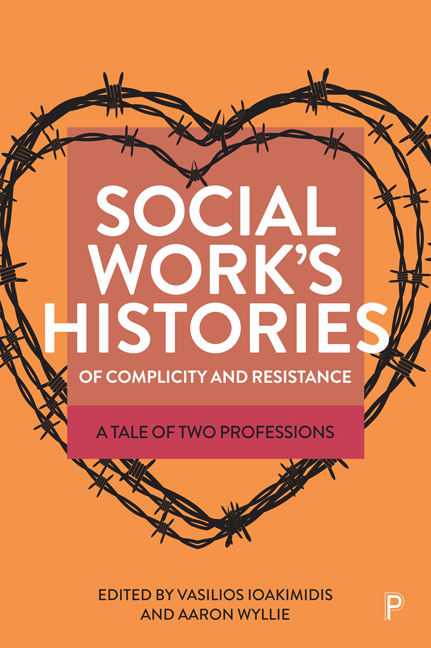Book contents
- Frontmatter
- Contents
- Notes on contributors
- Acknowledgements
- Preface
- Part I Making amends with the past
- Part II Legacies of colonialism and racism in social work
- Part III Social work’s contested ideologies
- Part IV Social work’s complicity with institutionalisation and detention
- Part V Survivor perspectives and contemporary reflections
- Index
7 - Social assistance in Franco’s fascist Spain (1939– 75): a history of social control, family segregation and stolen babies
Published online by Cambridge University Press: 20 January 2024
- Frontmatter
- Contents
- Notes on contributors
- Acknowledgements
- Preface
- Part I Making amends with the past
- Part II Legacies of colonialism and racism in social work
- Part III Social work’s contested ideologies
- Part IV Social work’s complicity with institutionalisation and detention
- Part V Survivor perspectives and contemporary reflections
- Index
Summary
Introduction
The first Spanish school of social work was founded in 1932 in the city of Barcelona during the Spanish II Republic (1931– 39), which historians consider the first attempt at democratic government in Spanish history. This school was financially supported by Raül Roviralta, who was a doctor and aristocrat, and was linked to a Belgian Catholic school of social work. According to the testimony of one of its students, the teachers at the school were prestigious and held varied ideologies (Estrada, cited in Barbero and Feu, 2016). The founding of this first school of social work in Spain is a wellknown and celebrated milestone in the development of the profession in the country, and social work students in Spain are taught about it. It is also widely known that the activity of this first school of social work was short lived, as it came to a halt with the outbreak of the Spanish Civil War (1936– 39), just four years after the school´s foundation. However, very little is known or discussed about some rather dark ramifications, discussed later in this chapter, of the school´s work and the pro-fascist political trajectory that its patron, Roviralta, followed during and after the war. This is just one small reflection of a significant political blindspot affecting most historical accounts of the evolution of social work in Spain: a lack of explicit acknowledgement of social work´s history of complicity and collaboration with the social control, oppression and indoctrination methods of the far-right dictatorship which was established at the end of the civil war in 1939 and lasted until 1975. Extreme implications of this complicity include instances of involvement in human rights abuses such as the forced removal and stealing of babies from political prisoners and other families deemed unworthy or incapable to raise their children according to the Spanish religious and cultural values that the dictatorship vowed to protect and enforce. Little is known, either, about the histories of social workers’ individual and collective resistance to such abuses.
Historical background: the Spanish Civil War and establishment of the francoist dictatorship
The Spanish Civil War started in 1936 as the result of a coup against the Republican government by a group of generals of the Spanish armed forces supported a number of nationalist conservative groups and political parties.
- Type
- Chapter
- Information
- Social Work's Histories of Complicity and ResistanceA Tale of Two Professions, pp. 109 - 120Publisher: Bristol University PressPrint publication year: 2023



